
Filter News
Area of Research
- Advanced Manufacturing (1)
- Biological Systems (2)
- Biology and Environment (70)
- Biology and Soft Matter (1)
- Computational Biology (2)
- Computational Engineering (1)
- Electricity and Smart Grid (1)
- Energy Science (56)
- Functional Materials for Energy (1)
- Fusion and Fission (4)
- Isotopes (6)
- Materials (26)
- Materials for Computing (3)
- National Security (6)
- Neutron Science (22)
- Nuclear Science and Technology (7)
- Quantum information Science (1)
- Supercomputing (28)
- Transportation Systems (1)
News Topics
- (-) Bioenergy (112)
- (-) Biomedical (73)
- (-) Molten Salt (10)
- 3-D Printing/Advanced Manufacturing (146)
- Advanced Reactors (40)
- Artificial Intelligence (131)
- Big Data (79)
- Biology (128)
- Biotechnology (39)
- Buildings (74)
- Chemical Sciences (86)
- Clean Water (33)
- Composites (35)
- Computer Science (226)
- Coronavirus (48)
- Critical Materials (29)
- Cybersecurity (35)
- Education (5)
- Element Discovery (1)
- Emergency (4)
- Energy Storage (114)
- Environment (218)
- Exascale Computing (67)
- Fossil Energy (8)
- Frontier (64)
- Fusion (66)
- Grid (74)
- High-Performance Computing (130)
- Hydropower (12)
- Irradiation (3)
- Isotopes (62)
- ITER (9)
- Machine Learning (68)
- Materials (157)
- Materials Science (158)
- Mathematics (12)
- Mercury (12)
- Microelectronics (4)
- Microscopy (56)
- Nanotechnology (64)
- National Security (86)
- Neutron Science (171)
- Nuclear Energy (122)
- Partnerships (68)
- Physics (69)
- Polymers (35)
- Quantum Computing (53)
- Quantum Science (93)
- Security (31)
- Simulation (65)
- Software (1)
- Space Exploration (26)
- Statistics (4)
- Summit (71)
- Transportation (103)
Media Contacts

The U.S. Environmental Protection Agency has approved the registration and use of a renewable gasoline blendstock developed by Vertimass LLC and ORNL that can significantly reduce the emissions profile of vehicles when added to conventional fuels.

Scientists at Oak Ridge National Laboratory and six other Department of Energy national laboratories have developed a United States-based perspective for achieving net-zero carbon emissions.
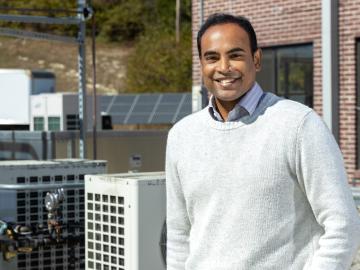
Cheekatamarla is a researcher in the Multifunctional Equipment Integration group with previous experience in product deployment. He is researching alternative energy sources such as hydrogen for cookstoves and his research supports the decarbonization of building technologies.
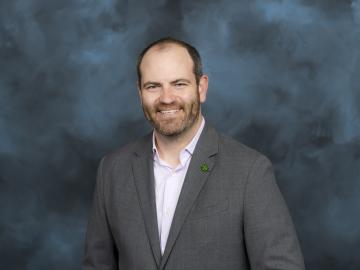
ORNL's Scott Curran, group leader for Fuel Science and Engine Technologies Research, has been named a fellow of SAE International and ASME.
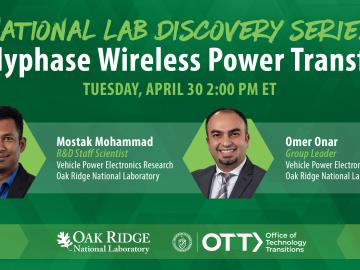
ORNL’s Omer Onar and Mostak Mohammad will present on ORNL's wireless charging technology in DOE’s Office of Technology Transitions National Lab Discovery Series Tuesday, April 30.

ORNL’s Erin Webb is co-leading a new Circular Bioeconomy Systems Convergent Research Initiative focused on advancing production and use of renewable carbon from Tennessee to meet societal needs.

A first-ever dataset bridging molecular information about the poplar tree microbiome to ecosystem-level processes has been released by a team of DOE scientists led by ORNL. The project aims to inform research regarding how natural systems function, their vulnerability to a changing climate and ultimately how plants might be engineered for better performance as sources of bioenergy and natural carbon storage.
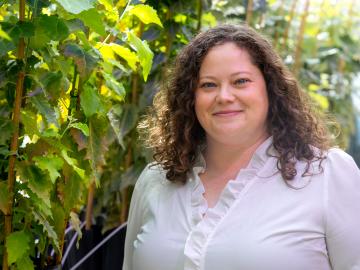
Alyssa Carrell started her science career studying the tallest inhabitants in the forest, but today is focused on some of its smallest — the microbial organisms that play an outsized role in plant health.
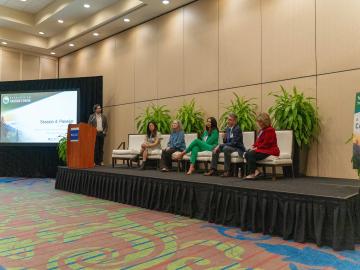
ORNL hosted the second annual Appalachian Carbon Forum in Lexington March 7-8, 2024, where ORNL and University of Kentucky’s Center for Applied Energy Research scientists led discussions with representatives from

Canan Karakaya, a R&D Staff member in the Chemical Process Scale-Up group at ORNL, was inspired to become a chemical engineer after she experienced a magical transformation that turned ammonia gas into ammonium nitrate, turning a liquid into white flakes gently floating through the air.


